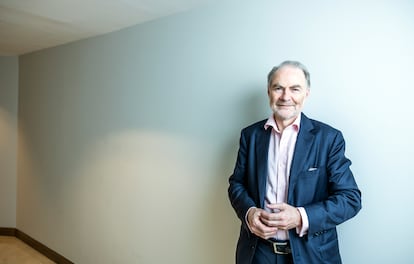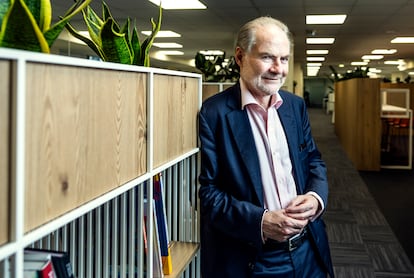Timothy Garton Ash: ‘We Europeans became lazy and hubristic’
The British journalist and historian defines the post-Wall era up to the present day in ‘Homelands: A Personal History of Europe’


If Tony Judt wrote, Postwar the outstanding handbook on European history after the Nazi era, it seems Timothy Garton Ash has picked up the baton. The London-born (1955) journalist and historian has published this year Homelands, a personal history of Europe (Taurus), a remarkable book that provides an understanding of the continent, especially the era that began after the fall of the Berlin Wall up to 2022. According to his play on words, if that was the postwar era, this has become the post-Wall period. In terms of what will come next, we have no crystal ball, but we do know one or two things.
Question. Your father fought in Normandy against the Germans and you tell the story of how you met the son of an enemy soldier, and how the next generation became allies. Do you think we Europeans always know how to put ourselves in the other’s shoes?
Answer. It should be what we Europeans are doing all the time, but I think we still have a way to go. What we have achieved is that we have millions of Europeans who feel, as I do, at home abroad. But if you look at the eurozone crisis, or even the war in Ukraine or the refugee crisis, that empathy does not go far enough.
Q. You define this era in your book, from 2008 to the war in Ukraine, as the ‘post-wall’ era.
A. This period begins with the fall of the Berlin Wall and ends with the full-scale invasion of Ukraine in 2022. And like a game of football, it is a game of two halves: we have the first half from 1989 to 2008, where we have unprecedented progress in the spread of freedom and democracy, with the extraordinary enlargement of the European Union to new free countries that did not previously exist on the map. And from 2008 on, we have the downward turn, the cascade of crises: with the eruption of the global financial crisis, Putin’s attack on Georgia, the eurozone crisis, the erosion of democracy in Hungary, the refugee crisis, Crimea, Brexit, Covid, Trump and so on until February 2022. And if you’re asking why? Half the answer is ‘hubris’. We simply became complacent, lazy, self-satisfied and hubristic. We believed that as things had gone well for us for years, that things would continue going that way. In other words, we confused history with a small ‘h’, history as it really happens, with History with a capital ‘H’ as a Hegelian process of inevitable progress towards freedom. But I don’t think we were so complacent or hubristic in the early 1990s.
Q. Is there any hope left?
A. In Madrid yesterday, on the gates of the Retiro Park I found a poster showing Stefan Zweig — and everyone refers to The World of Yesterday. When he was writing, Europe was at war, his own country was occupied, his people were being destroyed, everything was in ruins and he despaired and went on to commit suicide. The position from which I write is very different. Most of Europe is still relatively free, most of the EU still consists of democracies. And it’s now about mobilizing to defend the best Europe we’ve ever had rather than despairing about everything we have lost.
Q. To what extent does Putin threaten our way of life?
A. It’s not only because of the war in Ukraine. In a global opinion poll we have carried out at Oxford Research Projects we have found out that an alarming number of people outside Europe believe that the EU is likely to fall apart within the next twenty years. There is a strong correlation between those who believe the EU is going to fall apart (67% in China, for example) and those who believe that Russia is likely to win the war in Ukraine. In other words, the credibility of the EU as such is at stake in the war in Ukraine, much more than the fate of this country itself.
Q. Democracies are diminishing and so is Europe’s role in the world. Do you agree and why?
A. Europe still has extraordinary soft power. If you ask the question, other than in your own country, where would you like to live? People almost everywhere say in Europe or the U.S. Nobody wants to go and live in China or Russia. They like our way of life, our values. What we lack is hard power. So the challenge is to develop some hard power that matches our soft power. Now, in this new period because I think the post-wall period is over, we’re in a new period whose name we do not know, this is about how we meet the challenges from the outside: be it Russia, China, Turkey, Africa, climate change, migration, the prospect of Trump’s re-election. Much of Europe’s future no longer depends on what we’re doing inside our continent, which is the story of the last 50 years, but on what we’re doing in the rest of the world.
Q. What about leadership? You describe your meetings with leaders like Gorbachev, Kohl... Were they greater leaders or have we idealized them?
A. I don’t think you can read the history of Europe in the last fifty years and think that individuals don’t matter. Individuals really matter in history. The history of the Czech Republic would be very different today without Václav Havel. German unification would not have happened so peacefully and quickly without Mikhail Gorbachev, Helmut Kohl and George H. W. Bush. The lament that we no longer have leaders is often heard from former leaders, who tend to believe that things were rather better in their day. Mario Draghi has shown significant leadership. Kaja Kallas of Estonia has been an impressive leader for a very small country, right on the frontline with Russia. Ursula Von der Leyen has done a rather good job. So, I don’t think it’s all bad. What I would single out, a lack of strategic leadership from Europe’s central power, which is after all Germany. Emmanuel Macron has a strategic vision, but he doesn’t have the power to realize it. Germany has the power, but not the strategic vision.
Q. Are you referring to both Scholz and also Merkel?
A. I’m talking about the present, about Scholz. The paradox of Merkel is that, in a way, she is the personification of the best qualities of contemporary Germany: modest, responsible, reasonable, always seeking peaceful compromise, dialogue, always trying to be law-abiding ... of so many good qualities. And yet there’s a series of big mistakes, such as the failure in the response to the eurozone crisis. If Merkel had said “whatever it takes” in 2010, rather than Draghi a couple of years later, whatever it took would have been much less; the same in 2014 before the annexation of Crimea. Merkel was responsible for the weakness of the European response, for allowing such a dependent German economy or for allowing Victor Orban to demolish democracy in Hungary, where Germany is in a uniquely powerful position. So, there are quite a lot of sins of omission in the 2010s and someone jokingly suggested that her memoirs should be titled: “My Apologies.”

Q. Will we see Ukraine inside the European Union?
A. I do, it’s been a transformative moment for Ukraine’s place in history, it’s one of those once-in-a-century moments, where not only a country changes but the whole world’s perceptions of it. It will come into the EU in a very different way from other countries, step by step, incrementally, by sectors, it will not be a thing of that happens from one day to the next. It will be a new type of accession.
Q. Will there be a reversal of the Brexit? Will the UK return to Europe?
A. We’ve past peak Brexit, even the Rishi Sunak government is taking small steps to get closer to the EU. Actually, Cameron’s return is a sign of that, unthinkable a year or two ago. But it’s irrelevant. Unless something extraordinary happens, the next prime minister will be called Keir Starmer and he will then take more steps to get back closer to the EU. If the EU is doing well, the question will come back onto the agenda of British politics at the end of this decade or the beginning of the next. Maybe we will talk about returning to the customs union or the single market. It’s kind of up to you.
Q. Is there anything to be proud of in today’s England?
A. I’m a passionate English European, so I love my country and there’s still a lot to be proud of. It’s a beautiful country with an extraordinary culture and wonderful sense of humor. And British democracy has survived, it’s in a much better state than American democracy. The bad news is that as important as the negative economic consequences of Brexit has been the disastrous blow to Britain’s reputation, attractiveness with soft power and international influence. Now Britain is much less important even for the United States. And in continental Europe it has disappeared from the debate. There has been a disastrous loss of influence, which is very difficult to reverse. And the Conservatives compensate for this with the embarrassing rhetoric of Britain’s greatness. If you are great, you don’t need to say so. But democracy, as a whole, has survived. If you look at the challenges to democracy within the EU, also now in Spain, Britain is somewhere in the middle.
Q. Can Cameron save the Tories?
A. No, absolutely not. I’ll bet you a large bottle of good champagne that the Conservatives will lose the next election. It is a very weird choice that only proves Sunak’s desperation.
Q. Does the situation in Spain worry you?
A. How could it not be concerning, the fact that the situation is so polarized. For so many decades, Spain was one of the success stories, one of those European stories of democracy and freedom marching together. So obviously, it’s concerning. I very much hope that Spain comes out of it, not least because the Franco-German couple is not enough for the leadership that the EU needs. Draghi was the third of the leading trio. Maybe Donald Tusk can be that person, but he has huge problems at home, reversing his country’s populism. Spain is one of the two or three countries that, if they resolve their internal challenges, can play a great strategic role in European leadership.
Sign up for our weekly newsletter to get more English-language news coverage from EL PAÍS USA Edition
Tu suscripción se está usando en otro dispositivo
¿Quieres añadir otro usuario a tu suscripción?
Si continúas leyendo en este dispositivo, no se podrá leer en el otro.
FlechaTu suscripción se está usando en otro dispositivo y solo puedes acceder a EL PAÍS desde un dispositivo a la vez.
Si quieres compartir tu cuenta, cambia tu suscripción a la modalidad Premium, así podrás añadir otro usuario. Cada uno accederá con su propia cuenta de email, lo que os permitirá personalizar vuestra experiencia en EL PAÍS.
¿Tienes una suscripción de empresa? Accede aquí para contratar más cuentas.
En el caso de no saber quién está usando tu cuenta, te recomendamos cambiar tu contraseña aquí.
Si decides continuar compartiendo tu cuenta, este mensaje se mostrará en tu dispositivo y en el de la otra persona que está usando tu cuenta de forma indefinida, afectando a tu experiencia de lectura. Puedes consultar aquí los términos y condiciones de la suscripción digital.








































